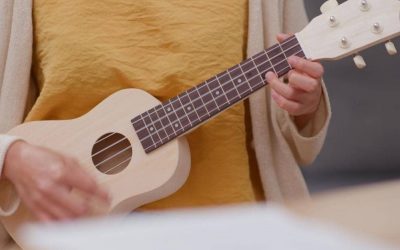If you’ve always loved to sing and you can’t afford lessons, or you’re simply a free thinker and like to do things on your own, it is indeed possible to teach yourself to sing. In fact, some of the world’s best musicians are self-taught, including Aretha Franklin, Prince, and Luciano Pavarotti, to name a few. If teaching yourself to sing is something you’re interested in, just keep in mind that it is like many other skills. In other words, if you work hard enough, you’ll be a success in the end.
That being said, there are things to know before you get started that can help you sing even better, and most of them are easy to learn and easy to do.

7 Ways You Can Teach Yourself to Sing
Learning how to sing involves more than just opening your mouth and singing words. It involves singing in tune and learning the proper techniques, among other things. While there are many steps needed to learn to be a good singer, below are seven of them that are especially important.
1. Learn to Take Care of Yourself
When you’re a singer, your voice is your instrument, and you have to take care of it. When you practice, sing for only 30 minutes minimum to a maximum of two hours per day so your vocal cords don’t wear out. Drink lots of water so your vocal cords stay nice and moist, and never smoke or drink a lot of caffeinated drinks or alcohol, which can dehydrate you. Also, learn to breathe through your diaphragm so that you can learn to belt out those notes and sound just like a pro.
2. Find the Best Vocal Range for Your Voice
All singers have different vocal ranges, and finding yours is easy. Just use a piano (or a tuning app if there is no piano handy) to find the middle C. Sing that note, then press the keys going down and sing every one of them until you get to a note that’s uncomfortable to sing. Next, do the same thing with the notes that start with the middle C and go higher. Once you learn the highest and lowest notes that you can sing comfortably, this will be your vocal range, and you’ll need to know this as you become more experienced in singing.
3. Learn the Fundamentals of Singing
Singing requires the right technique, and there are five things you’ll have to master before you can call yourself a singer. These are:
- Breathing. To sing the right way, you need to breathe with the diaphragm and open your chest cavity. Inhale and exhale deeply, and practice breathing exercises, which can be found online, every day.
- Rhythm. This involves knowing when to start and stop singing along to a piece of music. You can also learn rhythm if you keep practicing every day.
- Pitch. How your notes sound is dependent upon not singing either flat (too low) or sharp (too high). Learn to recognize the difference so you can learn how to sing correctly.
- Elocution. This is your ability to pronounce both consonants and vowels properly as you sing. The more you sing, the better you’ll become at this.
- Your voice. Get to know your voice because all voices are unique and different. This will help later on when you’re choosing the type of music you want to sing.
4. Record Yourself Regularly
As a singer, you’ll need to know exactly what you look like and sound like as you sing. Record your voice regularly and listen to it so you can determine which area needs improvement, and sing in front of a mirror if there’s no one around to film you as you sing. When you’re a singer, you have to look good and sound good, and you’ll only master these techniques if you film or record yourself regularly.
5. Learn the Basics of Music Theory
If you’re going to be a singer, you’ll want to learn how to read music. This isn’t a necessity, of course, but it certainly makes things a lot easier for you as you continue to hone your craft. Reading music can be time-consuming at first but isn’t really difficult. There are books that can teach you how to read music, which helps you pick out your own songs and enables you to compete with other musicians a lot better. You can also go online and visit one of the many websites that teaches people the basics of reading music.
6. Improve Your Tone
Your tone is your own unique vocal thumbprint and is already present when you start singing. It is determined by the shape of your head, sinuses, and throat. This is why all singers have their own one-of-a-kind tone. Improving your tone involves having a good singing posture, controlling your breathing in the right way, and learning how to start and end each note. Without working on your tone, you may end up singing either sharp or flat. For some people, it cannot be done without a vocal coach.
7. Build up Your Self-Confidence
If you sing timidly, the notes may sound flat or sharp or it may ruin the tone of the notes. Even in the beginning when you feel like you don’t know what you’re doing, belt out the notes anyway with confidence. After all, you’re going to make mistakes because that’s part of building up your skills. But if you make those mistakes with confidence, you’ll be able to determine what you need to work on next. Plus, this self-confidence will come in handy later on when you get to the stage.
How Long Does It Take to Teach Yourself to Sing?
The amount of time it takes you to learn how to sing varies with each individual and is affected by how often you practice and what your voice sounded like in the beginning. As a general rule, it takes roughly six months to one year to go from a beginner to an intermediate singer. Within the first year, you’ll definitely see an improvement over where you started. If you keep practicing, you can likely move up to an advanced level within a two-year period.
5 Dangers of Learning to Sing Yourself
As you can imagine, there is a downside to teaching yourself how to sing. Without a teacher, it’s harder to learn about technique, tone, pitch, and all of the other things you need to know to be a good singer. In fact, without a vocal coach, several things can happen, including:
- You may damage your voice. Not limiting the length of your practice sessions isn’t the only thing that can damage your vocal cords. Voice teachers will share other techniques that will help “save” your voice, and this goes a long way in helping to save those vocal cords so that you can use them for many years to come. If you damage your voice too much or in the wrong way, you may have to stop singing altogether, and no one wants this to happen.
- You may learn bad vocal techniques. There are a lot of things that can be included in vocal technique, and without a teacher these things are practically impossible to learn. When you teach yourself how to sing, you may either learn something incorrectly or not learn it at all, and both of these things are bad for your future as a singer. Even worse, you won’t know that you’re not learning something or learning it incorrectly simply because there’s not a teacher around to tell you this.
- You may not develop your own sound. A good music teacher can recognize what type of voice you have and help you develop your own sound and style. Without this, you may never know what you’re capable of doing. This is especially true if you’re trying to mimic your favorite singer, which may or may not be a good idea for your particular voice. Simply put, it’s much easier to develop your own unique singing style when there’s a competent music teacher by your side.
- You may end up developing bad habits. When learning to be a musician, numerous bad habits are always possible, but just like bad vocal techniques, you may not know this is what you’re doing if you’re not working with a teacher. Let’s face it, bad habits can be difficult to break and may take years to change. When you work with a teacher, this won’t happen because your bad habits will be corrected right away so that they don’t stick around for very long.
- You may not know your limitations. With rare exception, all singers have limitations. If you know what yours are upfront, you can begin to work on other methods and techniques that will best utilize your voice. Not knowing your limitations can result in a lot of frustration and even some embarrassment, especially once you get on stage. With a vocal coach or teacher, you’ll know your limitations upfront and will be able to work around them so that you can sound better from then on.





